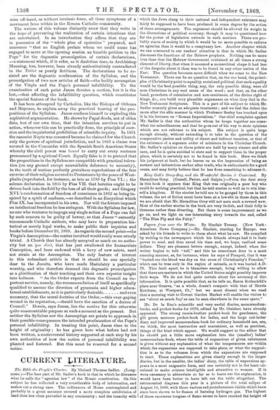CURRENT LITERATURE.
The Bible the People's Charter. By Michael Thomas Sadler. (Long- mans.)—The best part of Mr. Sadler's book is that in which he discusses what he calls the "agrarian law" of the Mosaic constitution. On this subject he has collected a very considerable body of information, and makes out a strong case. The ordinances of Moses contemplated and probably in a great measure secured a more complete subdivision of land than has often prevailed in any community ; and the tenacity with
which the Jews clung to their national and independent existence may fairly be supposed to have been produced in some degree by the action of these arrangements. The argument should be allowed its weight in the discussions of political economy, though it may be questioned how far the power of legislation extends in such matters. There are pro- bably states of society in which it would be no more possible to enforce an agrarian than it would be a sumptuary law. Another chapter which we can commend to our readers' attention is that in which Mr. Sadler discusses the functions of the Hebrew prophets. Nothing can be more true than that the Hebrew Government contained at all times a strong element of liberty, that when it assumed a monarchical shape it had less of the despotic about it than was to be found in any other nation of the East. The question becomes more difficult when we come to the New Testament. There can be no question that, on the one hand, the princi- ples of Christianity point to equality, social and political, that such equality would be the best possible thing, nay, the only possible thing, were alt men Christians in any real sense of the word ; and that, on the other hand, preachers of submission and non-resistance, of the divine right of kings, &c., can build very plausible arguments on what they find in the New Testament Scriptures. This is a part of his subject to which Mr. Sadler scarcely gives an adequate treatment ; and we feel the defect the more after the able manner in which Professor Seeley has touched upon it in his lectures on "Roman Imperialism." Our chief complaint against Mr. Sadler is that the authorities whom he heaps together are some- what too miscellaneous, and that he goes out of his way to state opinions. which are not relevant to his subject. His subject is quite large enough already, without extending it to take in the question of the comparative justice and utility of direct and indirect taxation, or that of the existence of a separate order of ministers in the Christian Church.. Mr. Sadler's opinions on these points are held by many sincere and able men, and he is quite entitled to state and to support them in the proper place, which is certainly not to be found in this book. Here we think his judgment at fault, but he leaves on us the impression of being an earnest and industrious seeker after truth, who is enthusiastic for a good cause, and may fairly believe that he has done something to advance it.






























 Previous page
Previous page